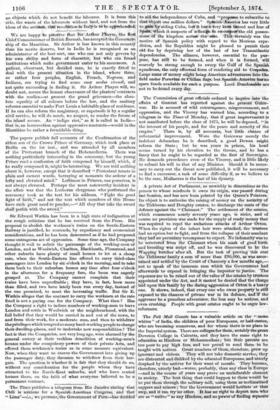We are happy to perceive that Sir Arthur Phayre, the
first Chief Commissioner of British turmah, has accepted the doverno't. ship of the Mauritius. Sir Arthur is less known in this country than his merits deserve, but in India he is recognised as an administrator of the best sort, one who can not only govern by his own ability and force of eharabter, but Who can found institutions which Melte &Veit-that Osier to his successors. A paEent, observant, but decided Man, he is exactly fitted to deal with the present situation in the island, where three, Or rather four peoples, English, French, Negroes, and Indians, are trying to find some easy nzodus vivendi, and not quite succeeding in finding it. Sir Arthur Phayre will, we doubt not, secure the honest observance of the planters' contracts with the coolies—at present the grand grievance—the abso- lute equality of all colours before the law, and the sanitary reforms eesential to make Port Louis a habitable-place of residence. If he can also reform the magistracy, or supersede it by a regular civil service, he will do much, we suspect, to render the future of the island secure. An "indigo riot," as it is called in India— that is, an insurrection against oppressive contracts—would in the
Mauritius be rather a formidable thing. .... ..






























 Previous page
Previous page